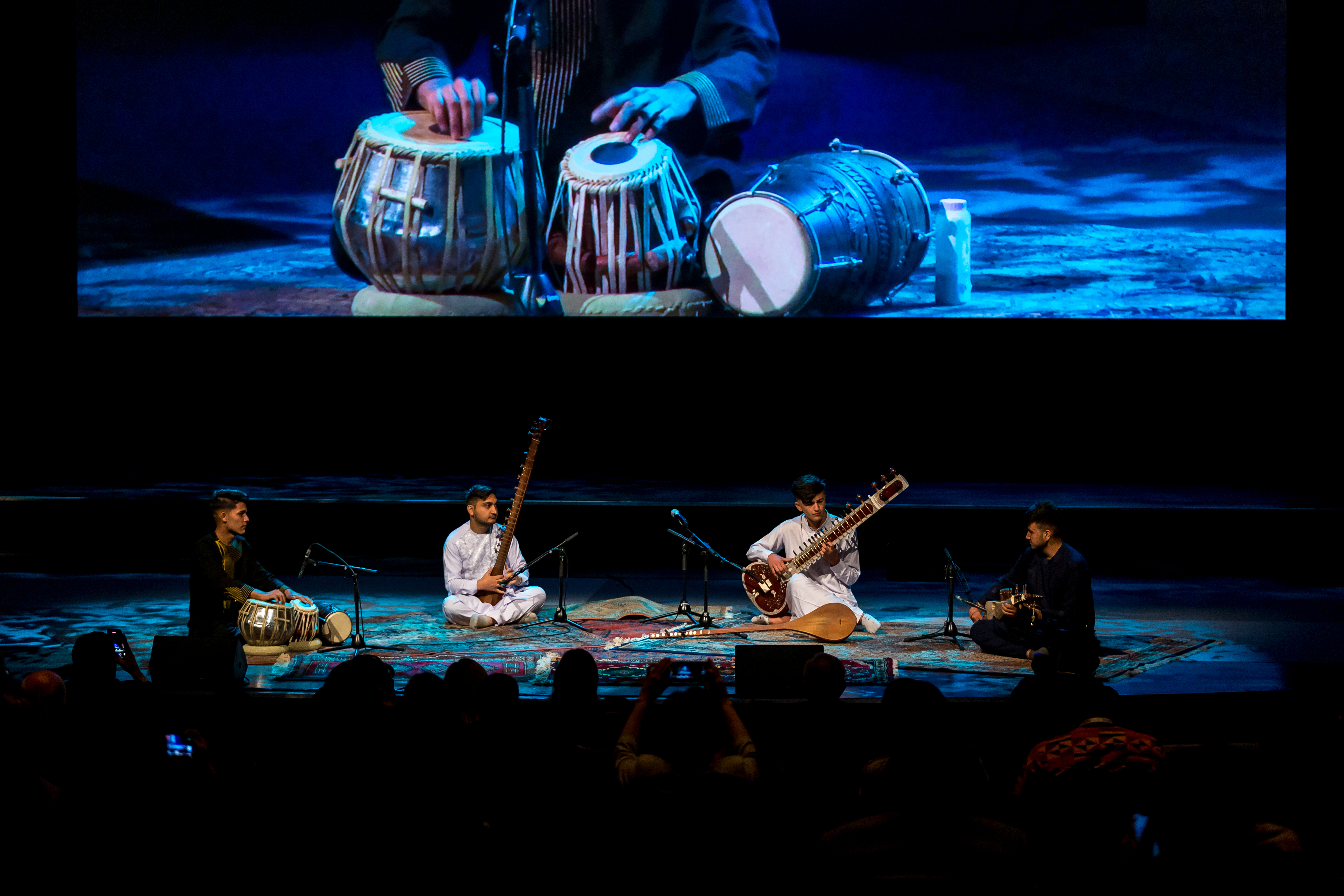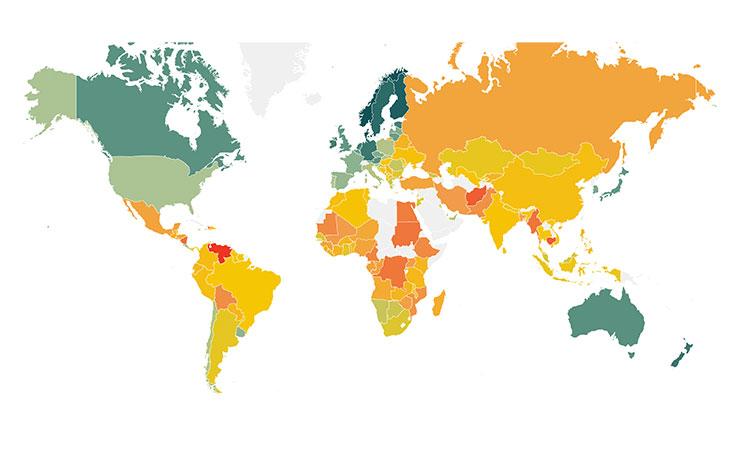
During the World Justice Forum, Dr. Ahmad Sarmast, founder of the Afghanistan National Institute of Music (ANIM), called on the international community to save Afghan music, women musicians, and all Afghan musicians. He described the human rights that have been stripped away since the Taliban’s August 2021 takeover made Afghanistan a “silent nation.” You can read Dr. Sarmast’s full remarks from June 1, 2022, in The Hague below, edited for clarity, and watch a performance by ANIM students who now live in exile Portugal.
Dr. Sarmast’s Remarks
Good afternoon. It's a great pleasure and honor for me to be standing here in front of you in the city whose name is closely associated with the justice. It's important to tell the story of the Afghanistan National Institute of Music, a music school called the happiest place in Afghanistan. A music school, which has been called also a beacon of hope for the country.
A music school, which in the past 12 years have been in the forefront of democratic values in Afghanistan. A music school, which has been transforming the life of disadvantaged children of the country, promoting gender equality in Afghanistan through music, empowering the girls and women of Afghanistan through music and music education, building bridges, not only between diverse, ethnic group of Afghanistan by facilitating music-making between children and youth of different ethnic communities, where, or through music-making, they’ll be learning also to respect each other's differences, get engaged in dialogue and live in peace and harmony.
I never imagined that I'll be standing in front of you once again. And I will be calling on the international community to save Afghan music, to save Afghan musicians. In the last 14 years, I've been always celebrating the return of music back to Afghanistan. I've been celebrating the power of girls and women in music in Afghanistan.
We've been making music and sharing the beauty of Afghan music with the rest of the world. But unfortunately, the unimaginable happened back in 15th of August when the Taliban returned to Afghanistan.
This is the day that once again, the misery of African music and musicians began. This is the day that the women of Afghanistan, once again, faced the draconian policies of the Taliban depriving women, women of Afghanistan and girls of Afghanistan, their every, basic human right to express themselves freely and fairly through music, rights to work, rights to be educated, and rights to educate.
A place which has been called the happiest place in Afghanistan today is a base for the al-Qaeda group, a place which was full of music and happiness and joy today is under the heat of the Taliban.
The practice rooms are empty. There's no sound of music any longer. From the day that the Taliban returned, they make every day the effort to silence this nation once again. And today that I'm talking to you, Afghanistan is a silent nation. Afghan children and youth are deprived of their music and musical rights.
Musical rights—I'm speaking in front of the people who are responsible for the rule of law, people, professionals who are responsible to ensuring that human rights is respected around the world, but I'm here standing in front of you to call a few, to call on you. And to let you know that every single musical right of the Afghan people are denied by the Taliban.
Afghan people do not have the right to listen to music. They are not allowed to learn musical languages. They are not allowed to make music. Afghan musicians are not allowed to make a living through music.
Musicians of Afghanistan do not have any longer in their disposals. All the vet, all the venues at means to share their music to the rest of the community.
Today where I'm standing here, once again, I'm very happy, but I've also sad. I'm happy that the community of that Afghanistan National Institute of Music has been rescued. They have once again, an opportunity to dream, to hope, and to make music. But I'm sad because the people of Afghanistan are deprived of the joy of music, the musicians of Afghanistan are deprived of the opportunity to deliver smart to the people of Afghanistan, to music.
Yes, Afghanistan National Institute of Music is safe in Portugal. Yes, we are committed to preserve and revive Afghan music or tradition in exile. We are committed to bring music back to Afghanistan, but where I'm standing here in front of you is not just music. It's not just Afghan musicians. Today, the people of Afghanistan, the women of Afghanistan, are deprived of their rights.
Rights to work, rights to be educated, and rights to educate. And therefore, while I'm standing here in front of you, I would like to call on you to call in this beautiful city whose name is associated with justice and law to improve or to demand from the Taliban the immediate release of Afghan journalists arrested by this terror group, I would like to call on you to demand that of women activists in Afghanistan.
I'm calling on you to make sure and demand from the Taliban to enforce the amnesty that they promised to the Afghan people, to the former members of the Afghan army and members of the Afghan government. Finally, I call on you to demand from the Taliban to restore the musical rights of the Afghan people.
With this demand, we will make sure that an Afghan child, by receiving a musical instrument, playing a musical instrument, is happy, and he or she smiles once again.
Today, have a very group of young musicians with a small ensemble of the Afghanistan National Institute of Music called Tarano. This group of musicians share with you the beauty of Afghan music. I'm confident that for some of you, maybe this is first time that you will hearing Afghan music and listening to Afghan instruments, maybe even seeing Afghan instruments for some of you, maybe the first time, but I call on you to make sure that this is not the last time that you see this group and that you listen to Afghan music.
Please save Afghan music and musicians today. Please save Afghan music and musicians today so they can sing tomorrow and to share the beauty of the music with all of you. Thank you very much for your attention.
And please meet the group of Tarano, made of four young, brave musicians:

Ramez Safar, a rubab player. Can you please show your instruments? Can you share your instrument please? This instrument has centuries of history, but this instrument is in danger inside of Afghanistan. This is considered to be the national instrument of my country.
Iqbal Asify, a tanbur player—is another traditional instrument of Afghanistan, which is in danger of becoming obsolete in my country.
Fawad Murad is a sitar player. Sitar is a musical instrument shared by the people of South Asia, an instrument, which is the result of a marriage of Tanbur and Vena of India.
And Fayaz Mohammadi is a tabla player from Afghanistan, playing again on instruments commonly used in south Asia. I hope you enjoy this evening and the beauty of Afghan music. Thank you very much.






